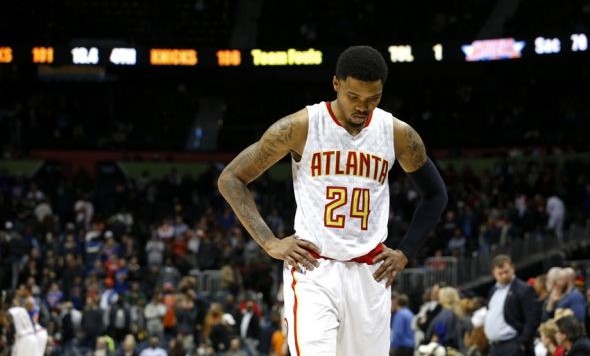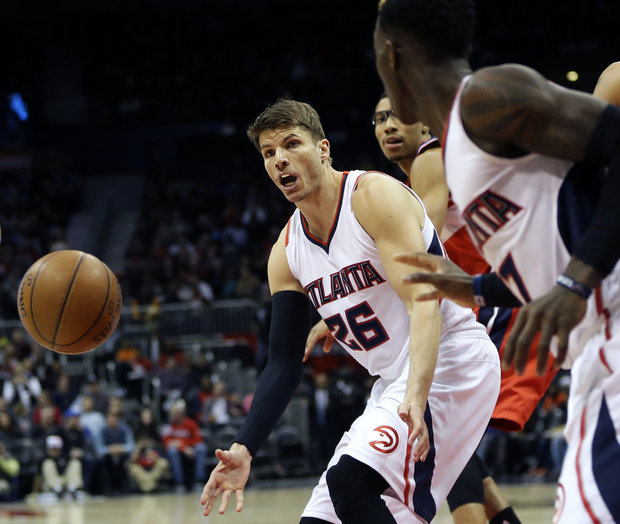As soon as the Atlanta Hawks were eviscerated in Game 2 of their series against the Cleveland Cavaliers, it became apparent the Eastern Conference semifinal would not last more than five games.
For the second straight season, the Hawks found no answers and no hope against the Cavs. There’s no shame in the losing itself, because Atlanta was the inferior team in each instance. However, two straight sweeps — one with a 60-win team, the other with a team whose defense was the best in the league (statistically) after the All-Star break — should cut deeply.
Cleveland — by necessity — became a defense-first team in last year’s playoffs due to the Kyrie Irving and Kevin Love injuries. This season — by choice — the Cavs pursued an offense-first approach. That both iterations of the Cavs brought out the brooms against the Hawks shows how far Atlanta is from being able to call itself an Eastern Conference title contender. Filtered through that lens, it’s easy to see why an outside observer would conclude that the Hawks must make major changes in the offseason, which began as soon as Paul Millsap’s three-pointer clanged off the iron at the end of Game 4 against the Cavs on Sunday afternoon.
However, is that understandable instinct a proper or prudent one? There’s a case to be made in support of it… but it’s not one you’ll see here.
The two men you see in the photo above, Kyle Korver and Dennis Schroder, in many ways embody the Hawks’ in-between situation.
Korver regressed this season, which is not a surprise, but the extent of his regression rates as an eye-catcher. No one expected Korver to match his luminous 2015 campaign, but the pronounced inability to hit open looks in the 2016 playoffs once again played a part in a sweep loss to Cleveland. Moderate — not even enormous — infusions of added makes could have won a game or two against the Cavs, but for a second straight month of May, the Korver Kounter didn’t add up for Atlanta.
As for Schroder, the skilled and never-boring German whirl of energy remains a rollercoaster ride. He can be so noticeably brilliant, as he was when he got hot in the second half of Game 1 against Cleveland. When he’s at his worst, though, he’s atrocious — he makes horrible decisions and fails to give the Hawks the floor leadership they need from a backup point guard. The ceiling of Schroder’s skill level and his overall quality as a player are nowhere near Russell Westbrook, but the specific combination of blinding speed and shaky decision making enable one to say that Schroder is a (very) poor man’s Westbrook. If Oklahoma City head coaches (Scott Brooks and now Billy Donovan) have had trouble getting through to Russ, Atlanta coach Mike Budenholzer has had trouble reaching Mr. Umlaut.
One could look at Korver and Schroder and conclude that Atlanta needs a reset as far as its supporting cast is concerned. Paul Millsap and Al Horford need more — and better — help if they’re going to be in a position to thrive in future seasons. Should that help come from a restructuring of the roster, or an attempt to better coach and organize the current one?
If the Hawks can envision a series of transactions which would radically reshape their roster in a way which helps Millsap and Horford, more power to them. However, it seems that the wiser approach — at least for one more season — is to see if this core group can make noticeable improvements. Such a conclusion emerges from one very simple realization: It was always going to be hard to expect the 2016 Hawks to live up to the 2015 version.
*
In 2015, the Hawks snuck up on the league… and produced the best season in the history of professional basketball in Atlanta. Being the hunted was — if not inevitably — certainly very likely to cause a regression in 2016. The Hawks have experienced NBA life in two sharply different competitive contexts over the past two seasons. It seems fair to the coach, the players, and even fans to see what this group can do now that it has “looked at life from both sides now,” as the song says.
An established principle in any business — very much including the sports world — is that you ought to know your employees can or can’t achieve certain goals before deciding to let go of them. There’s a difference between being uncertain about a player’s ceiling and — on the other hand — knowing he won’t take you beyond a certain point. With the Eastern Conference being as frail as it is, the Hawks could very realistically make the Eastern Conference Finals next season, and win two games against the Cavs. It won’t be easy to reach that point, but it’s certainly well within the range of possibility.
It would seem empty and unfulfilling if the Hawks aimed for a roster shakeup at this point in their evolution. Riding or dying in 2017 with their core group — keeping it intact if it can go deep into the East Finals, blowing it up if it meekly loses in the second round or worse — would enable the organization to say it gave this current roster every chance of succeeding. Then, in 2017, it can consider an appreciable revamping project if needed.
Yes, it’s no fun getting swept for a second straight season, but now that the Atlanta Hawks have realized how hard it is to follow up a 60-win season, they can go about the business of regaining that elevated position in the NBA and the East.


